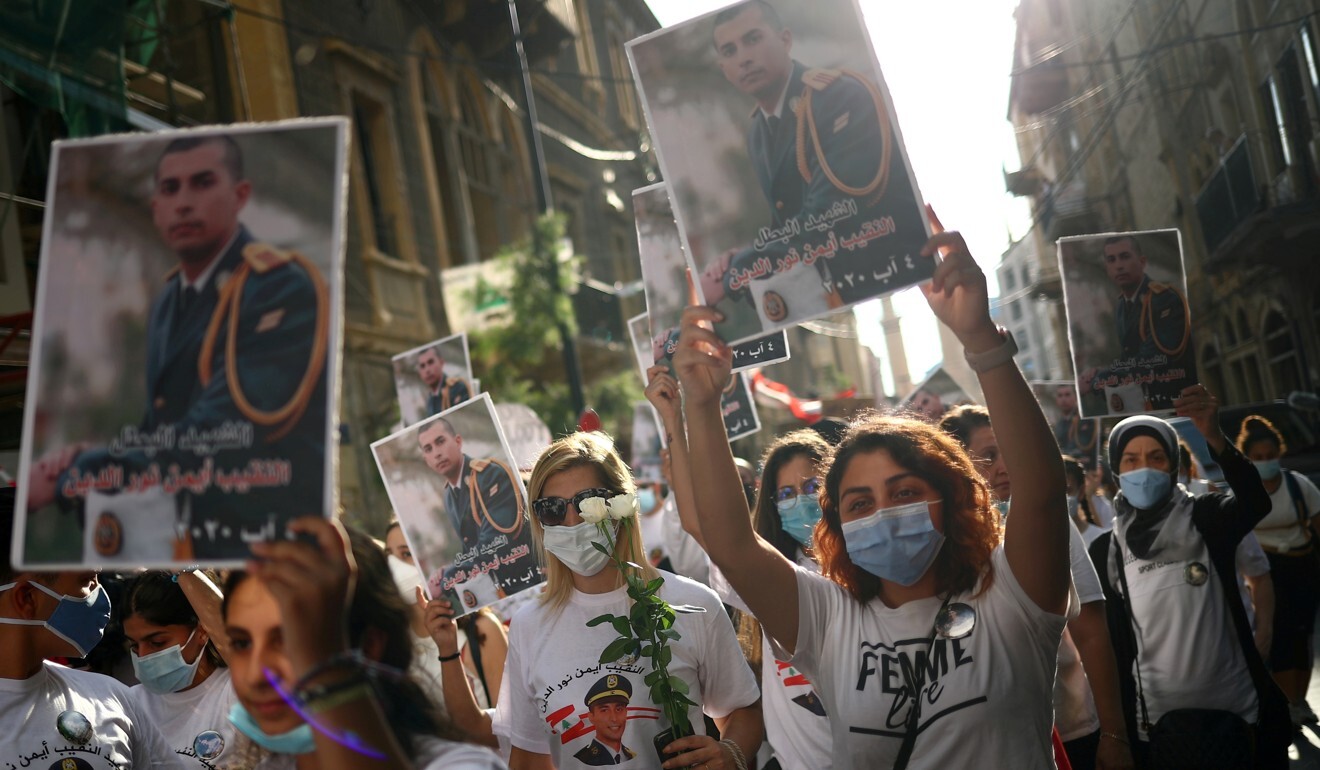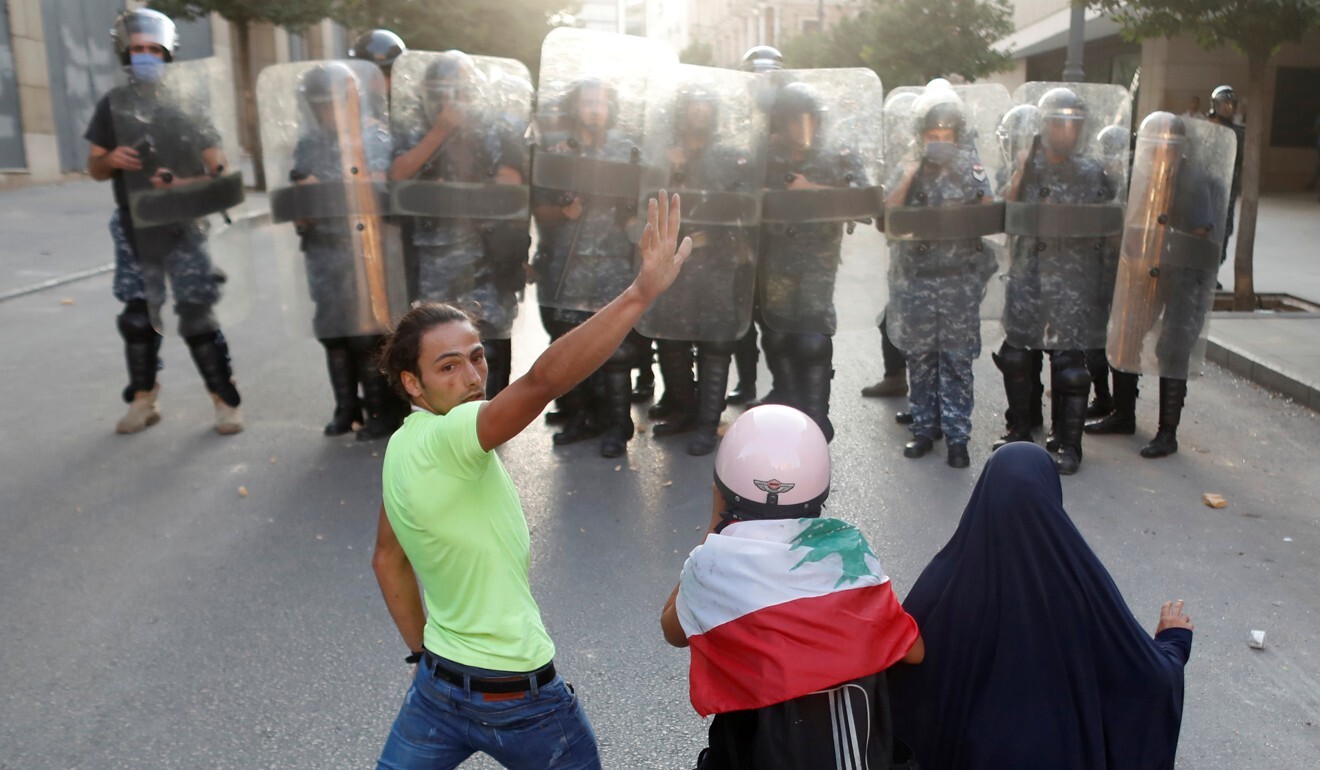
Beirut blast vigil erupts into violence as Lebanese demand real change
- Protesters throw rocks, while security forces fire tear gas and rubber bullets
- Effigy of President Michel Aoun is hanged from noose and set ablaze
An evening vigil to mark a week since Beirut’s devastating port explosion flared into protests on Tuesday, as the deep-seated anger directed toward the country’s leaders threatens to trigger a sustained new wave of demonstrations.
Protesters pelted rocks at the steel barriers thrown around the parliament as security forces confronted them with tear gas and rubber bullets. An effigy of President Michel Aoun hanging from a noose was set ablaze. Authorities announced the death toll from the blast had risen to 171.
Earlier, hundreds of people had gathered near the port, many wearing white and holding pictures of friends and relatives killed in the tragedy that flattened the port and wreaked destruction for miles. They held a large banner reading: “In my country, those who deserve to live die at the hands of those who deserve death.”
The crowd observed a minute’s silence at exactly 6.07pm, the time of the explosion, as mosques broadcast the call to prayer and church bells rang out across the downtown area.

The commemoration and demonstrations were a vivid reminder for the country’s squabbling politicians of what is at stake if they fail to quickly agree a way forward after Prime Minister Hassan Diab’s government quit on Monday with the economy in free fall for months.
Anger has surged in a nation already grimly familiar with decades of governmental malfeasance as it coped with the aftermath of a blast caused by 2,750 tonnes of explosive materials left for six years at the country’s main port, in spite of repeated safety warnings.
Parliamentary consultations to choose a new prime minister are expected to begin soon and the nomination process by parliament’s various factions will be a litmus test of whether the August 4 disaster marks an inflection point in Lebanese politics, or a continuation of decades of corrupt, inept rule.
One name being bandied about in the media as a potential premier is Nawaf Salam, a former ambassador to the United Nations who currently serves as a judge at the International Court of Justice in The Hague.
His candidacy could go some way to reassuring an outraged Lebanese public demanding an end to the corruption and sectarianism that have crippled their country.
But the militant Hezbollah group that heavily influences Lebanon’s economy and politics perceives him as being too close to the Americans and the UN. Diab’s predecessor, Saad Hariri, who governed for three years until January 2020, has said he does not want to be prime minister again at this point.
Local media reported that Lebanese leaders – who in the past have kept the country rudderless for months while they bickered over a candidate – are eager to wrap up the nomination process quickly so they do not have a vacuum during these difficult times. The blast came atop the country’s worst political and financial crisis in decades.
Lebanon explosion: alarm raised over chemicals at least 10 times before blast
Diab will continue in a caretaker capacity until a new governing coalition is formed. It is not clear how long that will take in a nation where political divisions mean talks can drag out for months, or whether a caretaker government could conclude any deal with the International Monetary Fund for a bailout or secure international aid.
In a speech on Monday announcing the government’s resignation after just seven months in office, Diab accused a corrupt political elite of sabotaging his administration.
“Each minister gave it their all,” he said. “But some people only care about scoring political points. Their corruption has led to this disaster.”

Diab had failed to deliver on the demands of protesters who have taken to the streets since October seeking change, nor had he advanced talks with donor countries and the IMF for billions of dollars in aid that a country drowning in debt so badly needs.
“We need to move forward with the reforms, structural reforms, not just normal reforms,” said Yassine Jaber, member of the Lebanese parliament.
“There has been resistance in the political scene for implementing these reforms. I think from here onwards, if this resistance persists, I think the country cannot delay doing these reforms any more and a total collapse is on the cards,” he said on a Bloomberg TV interview on Tuesday.
Even before the explosion, the government was barely functioning, unable to regularly collect trash or keep electricity flowing, let alone haul the country out of its worst crisis since the 15-year civil war ended in 1990.

